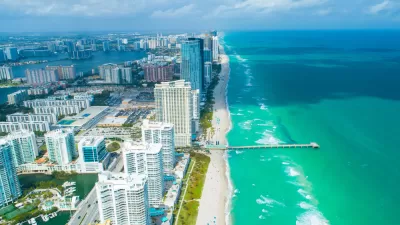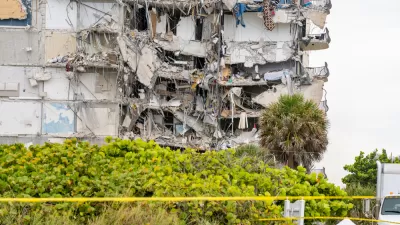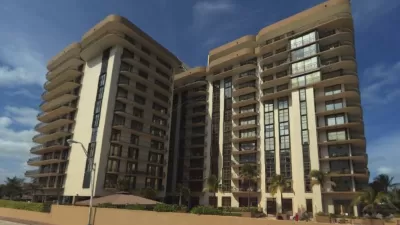New regulations aimed at preventing disasters like the Surfside condo collapse are forcing a reckoning on the part of property owners who may struggle to afford required repairs and upgrades.

New regulations governing condo construction in Florida, inspired by the disaster in Surfside, are facing pushback from industry leaders who say the law, as written, “presents a huge financial burden,” reports Robyn Griggs Lawrence for Construction Dive.
“By the end of 2024, the legislation requires condominiums that are at least three stories tall and within 3 miles of the coast be inspected by a licensed engineer or architect when they reach 25 years of age and buildings more than 3 miles inland at 30 years.” New buildings will also be required to install sprinkler systems as of January 2024.
The law would apply to around 1.5 million condo units in the state. Sensing the dilemma faced by many property owners unable to afford the new assessments, developers with deep pockets are swarming around property owners to buy up aging beachside buildings.
Long known as an affordable refuge for retirees, Florida quickly became the least affordable housing market in the country during the pandemic as demand grew and increasingly powerful storms threatened coastal areas. “Florida is also dealing with an insurance crisis, with homeowners paying nearly triple the U.S. average for property insurance and many insurance companies declaring insolvency, leaving the state or refusing to write new policies there.”
Attorneys in the industry say Florida’s legislation should serve as a model for other communities with aging condo buildings. According to Eric Glazer, a partner at Glazer & Sachs, “This is going to happen in every condominium everywhere in the United States that’s not requiring reserves. Florida clearly leads the country when it comes to condominium law.”
FULL STORY: Florida condo market braces for impact of new Surfside-inspired safety law

Alabama: Trump Terminates Settlements for Black Communities Harmed By Raw Sewage
Trump deemed the landmark civil rights agreement “illegal DEI and environmental justice policy.”

Study: Maui’s Plan to Convert Vacation Rentals to Long-Term Housing Could Cause Nearly $1 Billion Economic Loss
The plan would reduce visitor accommodation by 25% resulting in 1,900 jobs lost.

Planetizen Federal Action Tracker
A weekly monitor of how Trump’s orders and actions are impacting planners and planning in America.

Wind Energy on the Rise Despite Federal Policy Reversal
The Trump administration is revoking federal support for renewable energy, but demand for new projects continues unabated.

Passengers Flock to Caltrain After Electrification
The new electric trains are running faster and more reliably, leading to strong ridership growth on the Bay Area rail system.

Texas Churches Rally Behind ‘Yes in God’s Back Yard’ Legislation
Religious leaders want the state to reduce zoning regulations to streamline leasing church-owned land to housing developers.
Urban Design for Planners 1: Software Tools
This six-course series explores essential urban design concepts using open source software and equips planners with the tools they need to participate fully in the urban design process.
Planning for Universal Design
Learn the tools for implementing Universal Design in planning regulations.
Caltrans
Smith Gee Studio
Institute for Housing and Urban Development Studies (IHS)
City of Grandview
Harvard GSD Executive Education
Toledo-Lucas County Plan Commissions
Salt Lake City
NYU Wagner Graduate School of Public Service




























